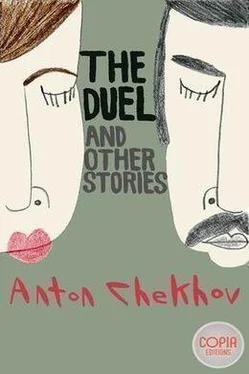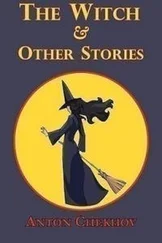"Auntie," said Vera quickly, "I'm going to marry Dr. Neshtchapov. Only talk to him yourself … I can't."
And again she went out into the fields. And wandering aimlessly about, she made up her mind that when she was married she would look after the house, doctor the peasants, teach in the school, that she would do all the things that other women of her circle did. And this perpetual dissatisfaction with herself and every one else, this series of crude mistakes which stand up like a mountain before one whenever one looks back upon one's past, she would accept as her real life to which she was fated, and she would expect nothing better…. Of course there was nothing better! Beautiful nature, dreams, music, told one story, but reality another. Evidently truth and happiness existed somewhere outside real life…. One must give up one's own life and merge oneself into this luxuriant steppe, boundless and indifferent as eternity, with its flowers, its ancient barrows, and its distant horizon, and then it would be well with one….
A month later Vera was living at the works.
FOR a cultivated man to be ignorant of foreign languages is a great inconvenience. Vorotov became acutely conscious of it when, after taking his degree, he began upon a piece of research work.
"It's awful," he said, breathing hard (although he was only twenty–six he was fat, heavy, and suffered from shortness of breath).
"It's awful! Without languages I'm like a bird without wings. I might just as well give up the work."
And he made up his mind at all costs to overcome his innate laziness, and to learn French and German; and began to look out for a teacher.
One winter noon, as Vorotov was sitting in his study at work, the servant told him that a young lady was inquiring for him.
"Ask her in," said Vorotov.
And a young lady elaborately dressed in the last fashion walked in. She introduced herself as a teacher of French, Alice Osipovna Enquête, and told Vorotov that she had been sent to him by one of his friends.
"Delighted! Please sit down," said Vorotov, breathing hard and putting his hand over the collar of his nightshirt (to breathe more freely he always wore a nightshirt at work instead of a stiff linen one with collar). "It was Pyotr Sergeitch sent you? Yes, yes … I asked him about it. Delighted!"
As he talked to Mdlle. Enquête he looked at her shyly and with curiosity. She was a genuine Frenchwoman, very elegant and still quite young. Judging from her pale, languid face, her short curly hair, and her unnaturally slim waist, she might have been eighteen; but looking at her broad, well–developed shoulders, the elegant lines of her back and her severe eyes, Vorotov thought that she was not less than three–and–twenty and might be twenty–five; but then again he began to think she was not more than eighteen. Her face looked as cold and business–like as the face of a person who has come to speak about money. She did not once smile or frown, and only once a look of perplexity flitted over her face when she learnt that she was not required to teach children, but a stout grown–up man.
"So, Alice Osipovna," said Vorotov, "we'll have a lesson every evening from seven to eight. As regards your terms—a rouble a lesson—I've nothing to say against that. By all means let it be a rouble…."
And he asked her if she would not have some tea or coffee, whether it was a fine day, and with a good–natured smile, stroking the baize of the table, he inquired in a friendly voice who she was, where she had studied, and what she lived on.
With a cold, business–like expression, Alice Osipovna answered that she had completed her studies at a private school and had the diploma of a private teacher, that her father had died lately of scarlet fever, that her mother was alive and made artificial flowers; that she, Mdlle. Enquête, taught in a private school till dinnertime, and after dinner was busy till evening giving lessons in different good families.
She went away leaving behind her the faint fragrance of a woman's clothes. For a long time afterwards Vorotov could not settle to work, but, sitting at the table stroking its green baize surface, he meditated.
"It's very pleasant to see a girl working to earn her own living," he thought. "On the other hand, it's very unpleasant to think that poverty should not spare such elegant and pretty girls as Alice Osipovna, and that she, too, should have to struggle for existence. It's a sad thing!"
Having never seen virtuous Frenchwomen before, he reflected also that this elegantly dressed young lady with her well–developed shoulders and exaggeratedly small waist in all probability followed another calling as well as giving French lessons.
The next evening when the clock pointed to five minutes to seven, Mdlle. Enquête appeared, rosy from the frost. She opened Margot, which she had brought with her, and without introduction began:
"French grammar has twenty–six letters. The first letter is called A , the second B … "
"Excuse me," Vorotov interrupted, smiling. "I must warn you, mademoiselle, that you must change your method a little in my case. You see, I know Russian, Greek, and Latin well…. I've studied comparative philology, and I think we might omit Margot and pass straight to reading some author."
And he explained to the French girl how grown–up people learn languages.
"A friend of mine," he said, "wanting to learn modern languages, laid before him the French, German, and Latin gospels, and read them side by side, carefully analysing each word, and would you believe it, he attained his object in less than a year. Let us do the same. We'll take some author and read him."
The French girl looked at him in perplexity. Evidently the suggestion seemed to her very naïve and ridiculous. If this strange proposal had been made to her by a child, she would certainly have been angry and have scolded it, but as he was a grown–up man and very stout and she could not scold him, she only shrugged her shoulders hardly perceptibly and said:
"As you please."
Vorotov rummaged in his bookcase and picked out a dog's–eared French book.
"Will this do?"
"It's all the same," she said.
"In that case let us begin, and good luck to it! Let's begin with the title … 'Mémoires.'"
"Reminiscences," Mdlle. Enquête translated.
With a good–natured smile, breathing hard, he spent a quarter of an hour over the word "Mémoires," and as much over the word de , and this wearied the young lady. She answered his questions languidly, grew confused, and evidently did not understand her pupil well, and did not attempt to understand him. Vorotov asked her questions, and at the same time kept looking at her fair hair and thinking:
"Her hair isn't naturally curly; she curls it. It's a strange thing! She works from morning to night, and yet she has time to curl her hair."
At eight o'clock precisely she got up, and saying coldly and dryly, "Au revoir, monsieur," walked out of the study, leaving behind her the same tender, delicate, disturbing fragrance. For a long time again her pupil did nothing; he sat at the table meditating.
During the days that followed he became convinced that his teacher was a charming, conscientious, and precise young lady, but that she was very badly educated, and incapable of teaching grown–up people, and he made up his mind not to waste his time, to get rid of her, and to engage another teacher. When she came the seventh time he took out of his pocket an envelope with seven roubles in it, and holding it in his hand, became very confused and began:
"Excuse me, Alice Osipovna, but I ought to tell you … I'm under painful necessity … "
Seeing the envelope, the French girl guessed what was meant, and for the first time during their lessons her face quivered and her cold, business–like expression vanished. She coloured a little, and dropping her eyes, began nervously fingering her slender gold chain. And Vorotov, seeing her perturbation, realised how much a rouble meant to her, and how bitter it would be to her to lose what she was earning.
Читать дальше












